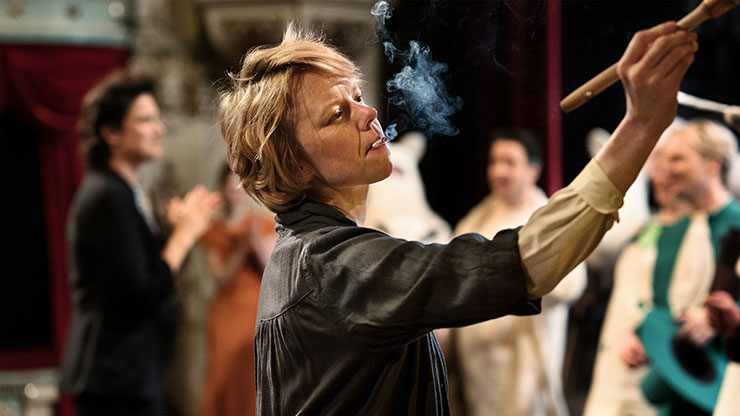
Alma Pöysti in a scene from "Tove." Photo courtesy: Juno Films.
There's still a week left to go in April, but to this avid movie watcher, the month has felt like a very long marathon: productive yet exhausting. This is also the time of year that bring on pangs of nostalgia, as memories of film festivals past flow my way like a strong river current. It's specially true this year, now that OUTshine, aka the South Florida event previously known as the Miami Gay & Lesbian Film Festival, has returned to its customary spring slot.
And there's the rub for us movie buffs. OUTshine's organizers have opted to hold on to those dates, even though their (virtual) 2020 event took place in late August due to the coronavirus pandemic. Meanwhile, other events have pushed their dates forward, and this has put OUTshine on a collision course with the Miami Jewish Film Festival, which is not scheduled to wrap up until this coming Thursday.
OUTshine starts Friday with the drive-in screening of the comedy “Potato Dreams of America” and runs through Sunday, May 2.
Both events boast stacked lineups, filled with high-profile premieres that merit a closer look, but the overlap forces those of us who take part in both to have to make some tough scheduling decisions.
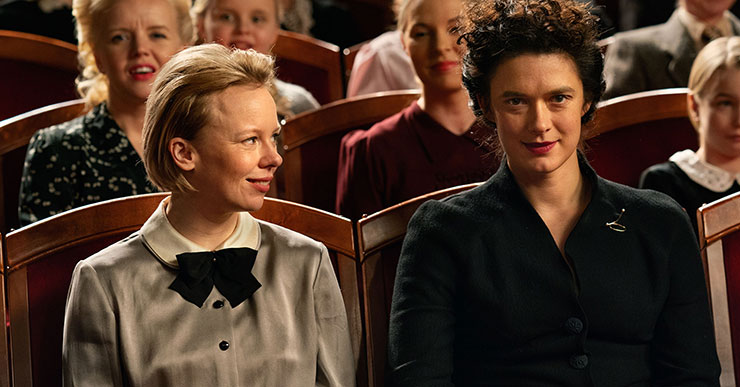
Alma Pöysti and Krista Kosonen in a scene from "Tove." Photo courtesy: Juno Films.
I'm sure OUTshine organizers will likely list the reasons why retaining their usual, pre-pandemic dates makes sense. It takes place right before the snow birds who are devoted patrons are about to go back north (or west).
Plus, one could argue, while the dates do partly overlap, that's not always the case with their audiences; they are not exactly identical. And yet, the feast-or-famine situation this outcome creates will likely have the unintended effect of causing some of the smaller films to fall between the cracks before they're able to find an appreciative audience.
Sometimes a wealth of riches is just information overload. I'm thinking a little more flexibility in the future is in order so two good festivals don't have to compete against each other? Just a thought.
Admittedly, it's hard to complain against OUTshine, and not because I'm biased. (Full disclosure: I worked for the event during its MGLFF days, from 1999 until 2005.) It's because of what Programming Director Joe Bilancio, Executive Director Victor Gimenez, Marketing Director Alexis Bosch and the rest of their team were able to pull off last year.
In the middle of the most difficult time many of us have gone through in our lifetimes, they not only put on a festival, but were able to assemble one of their very best lineups at the time when this community needed such a reprieve. It's no small feat, and it deserves to be celebrated.
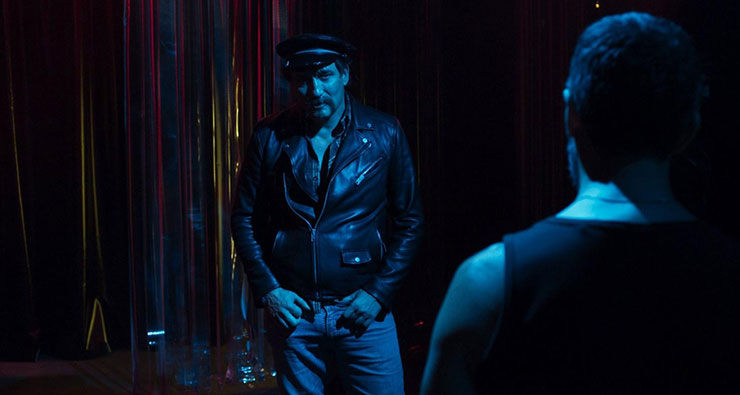
Oliver Masucci in a scene from "Enfant Terrible," Photo courtesy: Dark Star Pictures.
So what to say about the 2021 Miami lineup? It's too early to tell. I have only been able to pre-screen four of the 80-plus titles, five if you count Eytan Fox's “Sublet,” which had its local premiere earlier this month during the Miami Jewish Film Festival. The takeaway? A very mixed sampling that nevertheless gives you a lot to talk about. I'll try to keep it brief. We're talking about four dramas: a conventional biopic from Finland, a much less straitlaced biopic from Germany, a domestic drama from Spain, and a coming-of-age tale from Canada that's making its world premiere. Let's dig in.
“Tove”: Ever wonder what cartoonists do when they're not filling those panels and racing to meet deadlines? Turns out some of them didn't intend to set out on this career path. Also, their lives are not always as whimsical and lighthearted as what you end up reading on Sunday mornings.
All of this applies to Tove Jansson (Alma Pöysti), the real-life Helsinki-based artist trying to find her voice in the aftermath of World War II, not an easy goal when you're the daughter of a renowned sculptor. Her voyage of self-discovery in this biopic, Finland's entry for this year's International Feature Oscar, will involve affairs with two married people. First, she crosses paths with left-wing journalist Atos Wirtanen (Shanti Roney), who encourages her to follow her muse. She later meets theater director Vivica Bandler (Krista Kosonen), the daughter of the mayor of Helsinki. While the women's liaison generates sexual heat, Vivica is far less interested than Tove in nurturing an emotional connection.
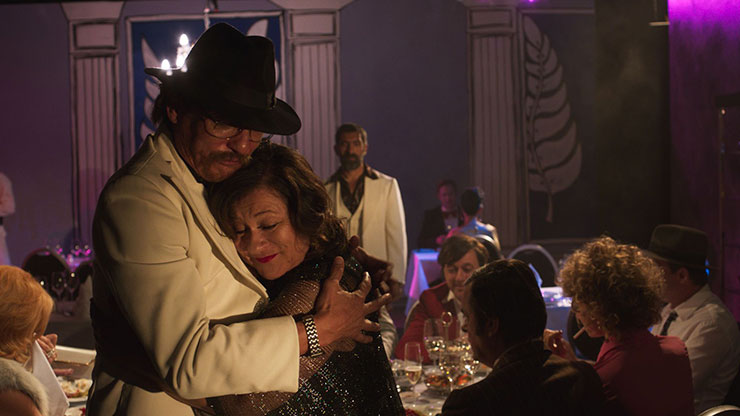
Oliver Masucci, Eva Mattes and Erdal Yildiz in a scene from "Enfant Terrible." Photo courtesy: Dark Star Pictures.
The bed hopping plays out as Tove, who is determined to make a go of it as a painter, fleshes out the Moomins, round fairy tale creatures that she initially conjured up as tales to entertain children she encountered in bomb shelters during the war. But Daddy dearest, Viktor (Robert Enckell), will have none of that. “That's not art,” he sniffs as he points to her Moomin drawings. Despite her father's misgivings, what starts out as a side project ends up taking over her creative life, Beatrix Potter-style. The easy thing would have been to vilify Viktor, to establish him as a negative and toxic influence, but that's not the way director Zaida Bergroth rolls. “Tove,” much to its benefit, doesn't have a hostile bone in its body.
Bergroth doesn't break any new ground here. She sees no need to rock the boat, but the middlebrow cinema-of-quality approach works in “Tove's” favor, thanks to slick production values that immerse viewers in this postwar community of artists, as well as a strong cast. You might be reminded of several big names while watching Pöysti, who brings an ethereal yet grounded quality to her performance. Depending on how she's photographed, the names that came to mind while watching her were Michelle Williams, Tilda Swinton, Naomi Watts, River Phoenix and even Kylie Minogue. By contrast, Kosonen looks like a cross between Rachel Weisz and the young Judy Davis. There's a bittersweet quality to her relationship with Tove that permeates the entire film. It nails the author's disarming warmth and curiosity.
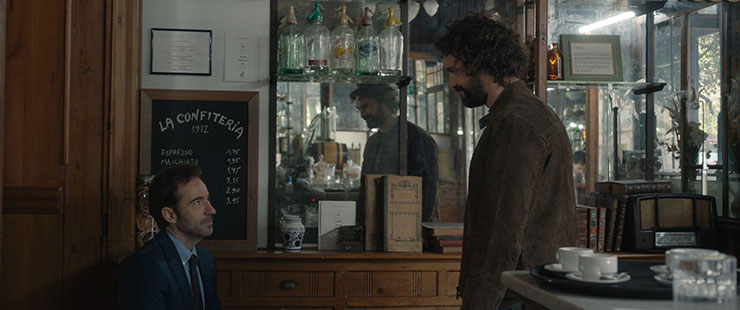
Pepe Ocio and Iván Sánchez in a scene from "Isaac." Photo courtesy: Breaking Glass Pictures.
“Enfant Terrible”: While Tove Jansson might not exactly be a household name on this side of the Atlantic, prolific German auteur Rainer Werner Fassbinder is far more familiar, particularly among us movie buffs. Therein lies part of the challenge director Oskar Roehler faces when telling his story. How do you make a biopic of someone who thumbed his nose at convention and reveled in breaking the rules throughout his life without turning the finished product in something that a maverick like Fassbinder would have detested?
The answers that Roehler comes up with don't always satisfy. In fact, whole chunks of “Enfant Terrible” are pretty frustrating. But much like Fassbinder's rough appearance and mercurial temper were more bark than bite, this chronicle of his rise to notoriety, and the people he screwed over along the way, grows on you following a shaky start. At the center of the film's issues is the actor playing Fassbinder. Oliver Masucci certainly looks and sounds the part. He is also three decades older than Fassbinder was when he started directing plays, and well over a decade older than the openly gay nonconformist was at the time of his untimely death at age 37. Masucci looks like Stacy Keach with a pornstache, though to be fair, Fassbinder also looked like that during his heyday. Only, you know, a younger version.
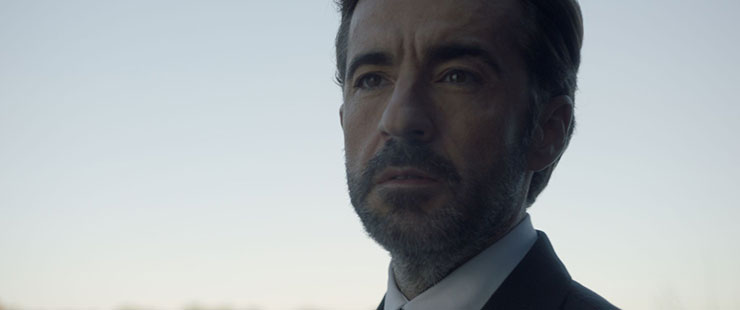
Pepe Ocio in a scene from "Isaac." Photo courtesy: Breaking Glass Pictures.
Roehler wants you to make the kind of suspension of disbelief that requires a leap of faith most moviegoers might not be willing to make. It's a lot to ask. Thankfully, he's not striving for realism, and “Enfant Terrible” hits its stride when it taps into the element of camp that was there in Fassbinder's work in varying degrees. The theatrical sets enhance the hedonistic wonderland Fassbinder created for himself, turning his apartment into a commune before he eventually lashed out at the very entourage he put together and fostered.
The narrative is a bit of a muddle, but so was Fassbinder's self-destructive workaholic schedule, which yielded dozens of theatrical releases, stage plays and TV productions. At 134 minutes, “Enfant Terrible” wears you out, but its larger-than-life subject, with his deep-seated insecurities, vicious cycles of codependency and commitment to be as nakedly honest as possible, is never boring. He couldn't be if he tried. Roehler has made a wildly uneven showcase for Fassbinder's fabulousness that's almost as self-indulgent as this irreverent free spirit was on his bad days, but you do get glimpses of his profane genius. It mostly errs on the right side of excess.
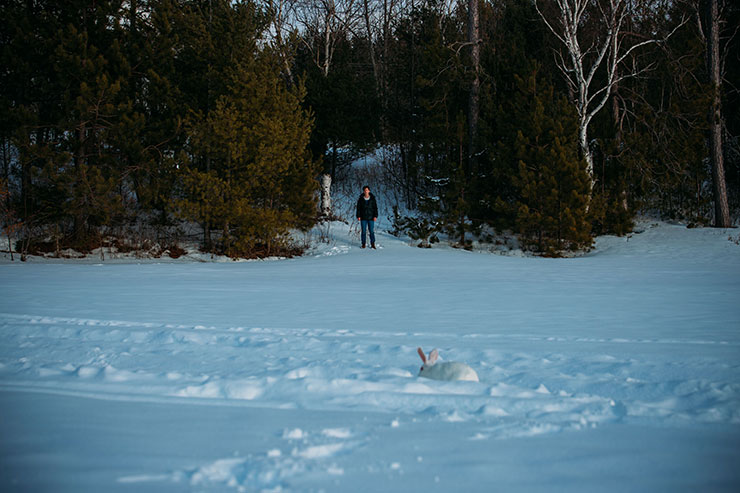
Harrison Browne in a scene from "On the Fringe of Wild." Photo courtesy: Breaking Glass Pictures.
“Isaac”: What if the old high school buddy you fantasized about finds his way back into your life years later? And what if there's some unfinished business between the two of you? This wish-fulfillment scenario is trotted out with attractively lensed but disappointingly drab results in this Spanish tale of repressed urges, sublimated regrets and a masochistic drive to uphold the status quo.
Nacho (Pepe Ocio, who resembles a young Javier Cámara) is a hotshot attorney who's got his eye on running for office. He's married to Marta (Maria Ribera), who works with him and runs their marriage much like a business. They want to get pregnant but have been unsuccessful. Marta's still-upper-lip mom suggests surrogacy, but that's a tricky proposition in Spain. The high-powered couple believe a baby will rekindle the flame. Only there wasn't much of one to begin with, was there? “Children give us social strength,” says Marta, spelling out her status-obsessed goals.
Enter Denis (hunky Iván Sánchez), an aspiring chef and restaurateur with dreams of opening up his own place. Once the childhood buddies reconnect, an idea materializes. Would Carmen (Erika Bleda), Denis' seamstress wife, be willing to carry Nacho's baby for a very sizable fee? Hemming, hawing and squabbling ensue. What would ostensibly bring both couples closer together instead unearths a minefield of issues. They include the titular character, a mutual close friend of the two men when they were teens. The absence of the “third musketeer” looms large over them, a ghost from the past that needs to be exorcised.
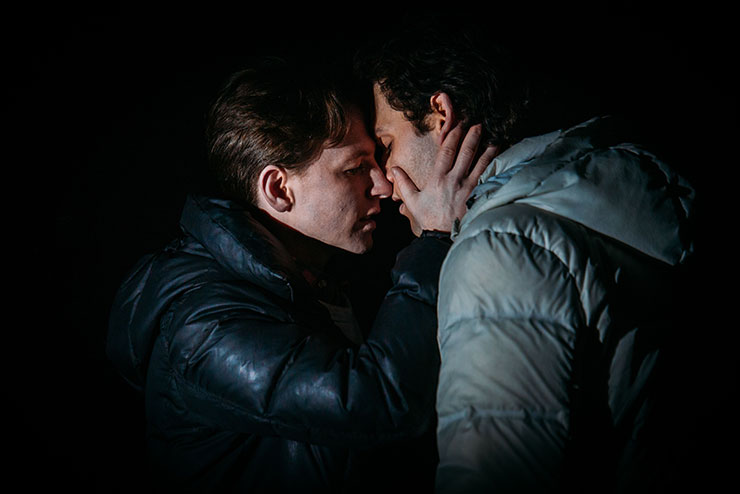
Harrison Browne and Cameron Stewart in a scene from "On the Fringe of Wild." Photo courtesy: Breaking Glass Pictures.
This is a whole lot of story for an 80-minute film, and it's clear the directing team of Ángeles Hernández and David Matamoros have bitten off more than they can chew. They attempt to give each of the four major players here their own arc, but a lot of “Isaac” doesn't resonate, because the characters' baggage lacks specificity. They're miserable in the usual ways. Because it depicts Nacho's compartmentalization of his professional life and his secret desires in strictly binary terms, the film is too often, let's not mince words here, a pill.
It also doesn't help that the filmmakers tiptoe around the gay stuff for too long. When they finally tackle the complicated bond between Nacho and hottie patottie Denis, “Isaac” becomes a much more engaging film. The nuance that was missing earlier comes to the fore in a climactic conversation between the two men that attains an ideal balance of tenderness and sobering candor. It's almost strong enough to absolve “Isaac's” trespasses, but Hernández and Matamoros hold on to the past in counterproductive ways, then attempt to flip the script with a resolution that wants to be progressive but ends up feeling unearned.
“On the Fringe of Wild”: It's not often that a movie comes along that's so egregiously misconceived that you start wondering if everyone involved is aware that the material is doing the opposite of what I'm hoping was the intended message. Feast your eyes on this steaming pile of heavy-handed symbolism, pious life lessons and cringe-inducing dialogue. Better yet, don't.
The setting is a remote town in Ontario where it seems the temperature never rises above freezing. Peter (John Cameron Mitchell look-alike Harrison Browne) gets picked on at school by popular kid Miles (Mikael Melo), who fashions himself some form of alpha male but is more effeminate than the target of his bullying. It's not much better at home for Peter, where the budding artist has to deal with a father dead set on toughening him up. “It's time he learns to be a man,” the dad, Nathan (Andrew Bee) tells the boy's mother. To that end, he takes Peter on a hunting trip. Ah, but see, Peter is sensitive. We know that because he draws fuzzy bunnies in his sketchbook. And wouldn't you know it, his dad runs over a white rabbit, then pulls over and forces the son to pick up the roadkill.
It's one in a series of provocations director Emma Catalfamo pokes viewers with, ostensibly to place us in her protagonist's tortured headspace. What Peter doesn't know is that there's another boy in town, Jack (Cameron Stewart), who is not only going through the same ordeal, but has it even worse. His dad, Harry (Adam Jenner) is a dangerous and unstable alcoholic who has done some terrible things. We know they're terrible because Jack blurts them out when they're arguing.
And then the two bullied boys meet. With Nathan conveniently nowhere to be seen, Peter asks Jack to stay the night, and “On the Fringe of Wild,” with its ominous shots of red bunny eyes and wintry landscapes, morphs from an after-school special from hell to a gay teen romance where the characters spend half the movie denying their feelings. Then they're subjected to more unspeakable mayhem. Catalfamo, working from a screenplay by Sorelle Doucet, also makes sure to throw in a house party from hell for good measure. But they can't even get the peer-pressure moment of humiliation right.
“On the Fringe of Wild” is a stomach-churning cocktail of inept filmmaking in service of a hamfisted approach to subject matter that called for a delicate hand. It's a movie about bigotry and homophobia, external and internalized, that's awfully fond of making its characters suffer, then ensures we taste every bit of their torment. There's no road to hell here for the filmmakers' noble intentions to guide us. We're already there. The OUTshine folks have seen it fit to include a trigger warning that features a major spoiler. That hardly seems fair. Even a movie as repellent and bizarrely awful as this one deserves to have its secrets remain intact.
“Tove” makes its Southeast premiere, and “Isaac” makes its North American premiere at OUTshine Miami. They are both available to stream from Saturday until Wednesday. “Enfant Terrible” makes its North American premiere, and “On the Fringe of Wild” makes its world premiere. They are both available to stream from Wednesday until Sunday, May 2. For more information, go to outshinefilm.com/films/program.




